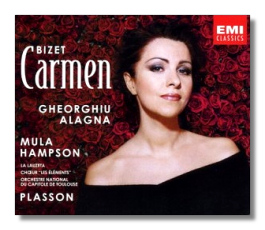
The Internet's Premier Classical Music Source
Related Links
- Bizet Reviews
- Latest Reviews
- More Reviews
-
By Composer
-
Collections
DVD & Blu-ray
Books
Concert Reviews
Articles/Interviews
Software
Audio
Search Amazon
Recommended Links
Site News
 CD Review
CD Review
Georges Bizet

Carmen
- Angela Gheorghiu (Carmen)
- Roberto Alagna (Don José )
- Inva Mula (Micaëla)
- Thomas Hampson (Escamillo)
"La Lauzeta" Choeur d'enfants
Choeur "Les Éléments"
Orchestre National du Capitole de Toulouse/Michel Plasson
EMI Classics 57434 DDD 3CDs 57:03, 40:10, 60:18
Forty years ago, Carmen was Carmen was Carmen. Since then, scholarship and taste have caused alternative performance editions to proliferate. Now, recordings of Carmen differ from each other almost as much as Les contes d'Hoffmann.
This newest version is both progressive and retrograde. The most notable innovation is an alternative version of Carmen's entrance aria. Set to an almost identical text, it is sprightly and flirtatious where the famous Habañera is sultry and seductive. It's appealing, but Bizet made the right decision in replacing it. Confusingly, this recording places the alternative aria right after the Habañera, where it feels like a cabaletta. The aria also slows down the action. It would have been better to include it as an appendix on Disc Three. The other notable innovation is the insertion of a short scene immediately after Micaëla's escape. A young wife, accompanied by her elderly husband, receives a billet doux from her lover under the husband's nose – Moralès and the soldiers comment on the pantomimed action. Musically, this scene is charming, but it holds up the action far too much.
In Act two, Plasson deletes Carmen's sarcastic parroting of José's protestation of love immediately before the Flower Song. This music, which several conductors have included since the 1970s, sharpens the drama, and I was sad to see it go. More oddly, Plasson has reinstated Guiraud's sung recitatives! The argument is made that this restores Carmen closer to the version in which it initially became internationally famous, but that is not a good argument. A better argument – one that hits closer to the truth, I think – is that it was feared that at least some of the singers could not deliver the spoken dialogue idiomatically or effectively.
One enjoys hearing opera's favorite married couple working together. This time around, I think the husband comes out on top. Alagna's Don José is unusually likeable, and while he doesn't have the honeyed sweetness of Gedda (with Beecham or Prêtre) or the intensity of Domingo (with Solti), he acquits himself well and brings some unique nuances to the role. (For example, at the opera's end, when he sings "Vous pouvez m'arrêter" – "You can arrest me" - there's a snarl of self-disgust in his voice.) Gheorghiu sounds great, but her performance seems to be based on bits of Berganza mixed with smatterings of Callas and drabs of de los Angeles. She's a chic Carmen, and she's obviously enjoying herself. Even so, this isn't a distinctive interpretation. One wonders if, deep down, she couldn't stand being mean to her husband! Inva Mula – a name new to me – is a standard-issue Micaëla with an attractive bright tone; she does little with the role apart from the usual wringing of hands. Hampson's handsomely sung bullfighter sounds heroic but detached, even glib. Has Escamillo been groomed for the big-time?
Plasson conducts idiomatically, although more sparkle was needed. The choruses and orchestra are well-drilled – too prim, really, for Bizet's drama, which needs more grit. You can't forget you're listening to a studio recording – there's a definite lack of spontaneity. The cheers after the Gypsy Dance and the Toreador's Song are studied.
Fans of the principals will enjoy this recording, and the added material is interesting, if hardly essential. In a competitive field, this Carmen is attractive but not really at the front of the pack.
Copyright © 2003, Raymond Tuttle


















